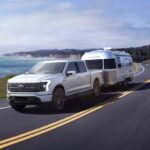EVs aren’t coming to motorsports—they’re already here. The FIA paved the way with the ABB FIA Formula E World Championship in 2014. Its success led to other international series like FIA ETCR (Electric Touring Car Racing), the Jaguar I-Pace eTrophy, the FIM Enel MotoE World Cup, and the FIA Rallycross World Championship to showcase high-speed EV action. However, no major series based in North America has yet been created for or made the switch to battery-electric.
Nevertheless, there’s a lot of well-founded talk about whether NASCAR could start using EV race cars. As the nation’s largest auto racing sanctioning body, NASCAR has a hand in everything from the national Cup, Xfinity, and Craftsman Truck Series to local stock car racing. (They also own IMSA for good measure.) Since its founding in 1948, NASCAR has been all about internal combustion. Most stock car series they operate and sanction still use carbureted engines even though fuel injection is standard on street cars. Could a sanctioning body that’s arguably the face of “Combustion Culture” one day go electric?
NASCAR Talks an EV Series—Or Did They?
Speculation of NASCAR going electric went into high gear a few years ago. NASCAR had previously talked about adopting hybrid powertrain technology, and they said in a March 2022 press conference that they were looking into a potential exhibition (i.e. non-point) series for EVs. Then in July 2022, an allegedly official document was leaked where NASCAR proposed introducing an EV prototype at the 2023 Busch Clash, then holding a six-event EV demonstration series in 2023 and 2024. The document outlined several other goals, which included using the exhibition race findings to “determine (the) best path forward” for its national touring series.
The information quickly spurred more discussion about NASCAR having a sanctioned EV championship series, whether as a new standalone series or replacing the vehicles for an existing series. In an episode of his podcast, NASCAR Hall of Famer Dale Earnhardt Jr. even discussed the possibility of the Xfinity Series switching to EVs to regain relevance among automakers. (He also added that he’d heard NASCAR mention interest in an SUV-based series due to their market dominance.)
However, nothing ultimately came of the proposal. No prototype was introduced at the 2023 Clash, and to date, there have been no NASCAR EV exhibition races. To this day, it’s still not certain whether the leaked document was genuine, as NASCAR refused to confirm or deny the information it contained.
Unveiling the First NASCAR EV Prototype
As it turns out, NASCAR wasn’t sitting on its hands regarding EVs. Although it came 17 months “late,” there is now an official NASCAR EV prototype to consider. NASCAR showcased the prototype, which was developed in partnership with Ford, Chevy, and Toyota, the three OEMs involved with the Cup Series, as part of the Chicago Street Course event in July 2024. They also announced a further technical alliance with ABB, the same multinational company that sponsors the Formula E Series.
The prototype car was built on an existing Next-Gen Cup Series chassis and has a rear spoiler, but that’s where the comparisons end. It uses a trio of electric motors that produce up to 1,360 hp, double what current Cup Series engines can do. The prototype also has a crossover SUV body and all-wheel drive. NASCAR said it’s best suited to short tracks and road courses, and two-time Cup Series winner David Ragan is serving as a test driver.
NASCAR stopped short of saying they had plans for an EV series. Rather, they claimed the main purpose of its prototype was to show what can be done with BEV technology. In the same press release, though, NASCAR said its goal was to have a neutral carbon footprint by 2035. This certainly implies major changes are on the horizon.
Chevy and Ford Release Electric Stock Car Prototypes
Automakers play a huge role in the national NASCAR series beyond having their names on the cars. Although not at the same level as Formula 1, manufacturers provide extensive technical and financial support ranging from wind tunnel testing to driver marketing. The reason is simple. As they’ve said since the early days of NASCAR, “Win on Sunday, sell on Monday.”
It isn’t shocking that some manufacturers would make their own EV racing prototypes. Ford struck first, debuting a NASCAR EV concept car in late January 2025. Using the Ford Mustang Mach-E crossover as the foundation, this prototype takes its suspension, chassis center sections, wheels, brakes, and steering rack from the existing Cup Series Ford Mustang. From there, the Mach-E prototype adds carbon fiber body panels and flooring, and it uses three electric motors with a 78-kWh battery pack. (Power numbers were not released.) Ford also says it will enter a separate EV demonstrator car based on the Mustang Mach-E in this year’s Pikes Peak International Hill Climb.
A few weeks later, Chevy entered the NASCAR EV prototype chat with an exhibit at the season-opening Daytona 500. Named the Chevy Blazer EV.R, it’s based on the Blazer SS EV crossover, but it increases the horsepower from 615 to 1,300 thanks to electric motors that can exceed 15,000 RPM. The suspension and chassis are again adapted from the Next-Gen car with slight modifications, and Chevy uses the same battery setup as Ford. Like the other two prototypes, it’s officially a preview of what might come rather than a vehicle intended to race.
How Are NASCAR Fans Responding?
Of course, the million-dollar question is whether people will watch NASCAR with EVs. As someone who has followed NASCAR nearly all my life, I can tell you first-hand that NASCAR fans are collectively resistant to change. There is also a large segment of older fans who, to paraphrase a friend of mine, want everything to return to the way it was in 1987.
Knowing this, the backlash to the idea of EVs was predictable. In 2022, NASCAR YouTuber The Iceberg released a video about the proposed EV exhibition series and Earnhardt’s speculation. The comment section immediately filled with people lambasting the thought. One poster declared, “It might actually be the nail in the coffin that gets me to stop watching.” Another added, “Nobody has ever tuned into NASCAR hoping to hear the silent hums of Teslas going 200 mph at Daytona.” More recently, former NASCAR Cup Champion and current Fox commentator Kevin Harvick decried the NASCAR prototype, saying it was about optics and politics more than anything and that “There is no future for NASCAR electric vehicle racing.”
But some people are more open to EVs, and that’s the camp I’m in. Despite claims to the contrary, NASCAR was never about American muscle. It was about automakers getting their newest cars in front of fans. Remember, NASCAR originally stood for “National Association for Stock Car Automobile Racing.” That means racing cars that consumers are interested in, whether they are gas-powered, hybrid, electric, or horse-drawn. Once upon a time, NASCAR even had a rule that 500 street-legal copies of a car model had to be sold before a racing version could compete.
Although EV market share in the US has plateaued for now, it remains significant, with many new production vehicle models, i.e. stock cars, being electric. When you add automakers like Ford and Chevy severely paring down their gas-only car lineups and ever-increasing emissions requirements, a NASCAR EV series makes logical sense. If “Win on Sunday, sell on Monday” works for internal combustion engine cars, I say it can work for EVs, too.
Gazing Into the NASCAR EV Crystal Ball
After all that, here’s my prediction. Eventually, NASCAR will have an EV racing series. How soon it happens depends on how the consumer market evolves. If EVs start consistently gaining market share again, I foresee NASCAR accelerating its EV plans, especially if automakers pressure them to. If the EV market remains stagnant, NASCAR will likely hit the brakes on development and focus on traditional combustion and/or hybrid technology. Either way, racing fans should pay attention to developments as they could have far-reaching effects and influence beyond NASCAR circles.




